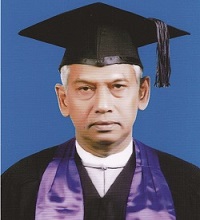CHAIRMAN MESSAGE

The Ministry of Education, with the approval of the Government, formed The Myanmar Academy of Arts and Science (MAAS) on 19 th August 1999. The main body of the academy is composed of members who were nominated by a search–cum-selection committee. The executive committee is a mix of eminent academics, experienced educators, reputed administrators, and outstanding scholars in such fields as natural sciences, social sciences, arts, humanities, etc. Among executive members; the number still in service far exceeds those of retired senior citizens.
The primary mission of MAAS is to participate and contribute to the reforms that are required to develop and promote higher education and to prepare upcoming future generations to cope with the emerging technologies of the 21 st century.
MAAS collaborates with the Academy of Medical Science, the Academy of Technology and the Academy of Agriculture, Livestock and Fishery Sciences including Myanmar Institute of Strategic and international studies (Myanmar-ISIS) in matters of inter-disciplinary and multi-disciplinary researches. MAAS has become a member of the Science Council of Asia (SCA) since 2014. It also cooperates with international Higher Education Institutions.
Socio-economic development does rely on natural endowment, yet it is the quality of human resources that brings about prosperity. In recognition of this paradigm for raising human capital, quality education has become the inevitable. To strive for the development of highly qualified human resources, the Ministry of Education formulated the thirty-year long-term Education Development Plan (2001-02 – 2030-31) with the aim of enhancing access, equity and quality. The long-term plan had its focus on the following six areas:
- Development of human resource
- Utilization of technology
- Expansion of research
- Development of a lifelong learning society
- Promotion of the quality of education, preservation of national identity and national values.
MAAS was also involved in drafting the five-year National Education Strategic Plan 2016-2021(NESP). With regard to the higher education system, NESP specified three strategies given below-
-
- Strengthening higher education governance and management capacity;
- Encouraging local teaching staff to undertake quality research and offering effective teaching in order to provide students with an effective learning experience;
- Improving the access to high quality education with no discrimination and regardless of the students’ social and economic backgrounds.
MAAS convenes research conferences every year, calls for research papers and research reports based on PhD theses for awarding prizes to presenters. The Journal of MAAS serves as the platform for publication of research papers that meet standards set by MAAS.
MMAAS is firmly resolved to do everything within its power to help fulfill the national aspirations of the state and the people.

